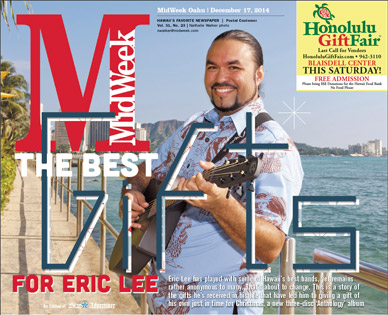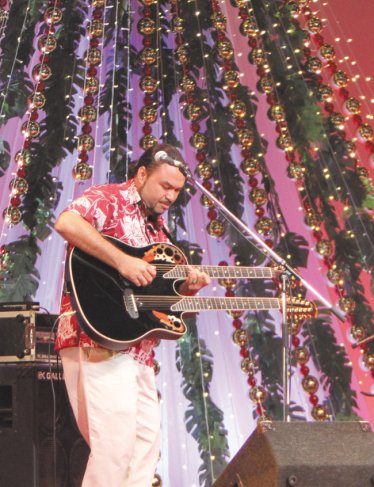The Best Gifts For Eric Lee
The Shepherd’s Song
Before Lee could learn to shred on the guitar, he needed someone to believe in him — a shepherd of sorts to place a 12-string staff in his hand, lead him into greener note-filled pastures, and calm his restless songwriting soul.
Enter Alfred Ekau Jr., affectionately known to church members and friends as “Uncle Junior,” and the man who would become the proverbial master appearing to a then-14-year-old student eager to be taught.
mw-cover-121714-eric-lee-7
Lee recounts the story of how he found favor with Ekau:
“Uncle Junior took it upon himself to approach me when it came time for me to learn the guitar. My dad actually wanted me to get involved with a prayer service at our church, one that involved musicians, and I ended up going to practice at the home of Uncle Junior. I was pretty much just playing keyboards at the time, but Uncle Junior had one of his sons go upstairs and bring down a 12-string guitar called ‘Dreams’ for me to play.”
This was no ordinary Yamaha guitar. For one thing, Dreams belonged to The Makaha Sons’ Skippy Kamakawiwo‘ole, a close friend of Ekau who had died about six years prior. For another, the guitar’s action, or the distance between its steel strings and fretboard, was incredibly high, thus making it a finger-cramping nightmare for inexperienced players.
That Ekau would simply hand over this chalice of an instrument to a thirsty yet wet-behind-the-ears musician is a testament to his faith in the pupil. Lee’s steely determination and drive had undoubtedly impressed him, leading Ekau to encourage the teenager to take Dreams home “just so that I could practice on it and start building up strength in my fingers.” Later, Ekau would help Lee navigate his way around the fingerboard by introducing him to a few traditional Hawaiian music licks, chord progressions and vamps.
And then, one day, Ekau asked Lee to take part in a Hawaiian language meeting that would involve another friend of his, Louis “Moon” Kauakahi of The Makaha Sons. Lee gladly accepted the invitation, as he did on another occasion when the discussions with Kauakahi turned to music. Naturally, Lee was thrilled to be in the company of these men, but he was still careful not to overstep his bounds by asking too many questions. Instead, he simply listened and feasted on the Hawaiian masters’ words as if they were manna from heaven.
Years later, he finally realized what Ekau’s true purpose was in inviting him to these meetings.
“He was kind of setting things up for me, building my relationship with Moon by having me hang out with his crowd, all the while making me feel like I was part of that gang,” explains Lee.
In other words, he was acting like any good shepherd would in safely leading his lamb toward its eventual destination. Of Ekau’s lifelong guiding influence, Lee is adamant about its positive impact. “He’s been such a gift to me.”
Three Wise Sons
For some reason unknown to Lee, Kauakahi decided to invite him to a recording studio in 1990 to hear tracks from the band’s forthcoming and ultimately most commercially successful album, Ho‘oluana. And almost immediately, Lee hit it off with the band’s remaining members, John and Jerome Koko, whom he was meeting for the first time. Days later, he found himself sitting in Jerome’s living room in Makaha and jamming with one of Hawaii’s most revered guitarists.
“To be honest, I couldn’t keep up with him at all,” recalls Lee, chuckling at the memory. “It was more of a ‘wow’ moment for me watching Jerome rip. I wound up taking one of his Ovation Elite series guitars home to practice on — even brought it to school the next day to show off. I was like, ‘Yeah, this is Jerome Koko’s guitar, you know.’ And everyone was like, ‘Wow!'”
From this jam session and future songwriting collaborations with The Makaha Sons, Lee was afforded the rare opportunity of learning at the feet of this trinity of music giants — all of whom were more than willing to share wise counsel with the budding artist. Jerome’s advice often dealt with guitar technique, while Kauakahi provided tips on songwriting and song arrangement, as well as insights into the music business. As for John, he kept his conversations with Lee light and humorous, but in doing so demonstrated why he was such a master at interacting with others and thus beloved by many. And in between all the laughter, he’d also show the youngster how to handle the upright bass.
As Lee says of Makaha’s favorite three sons, “Whether they knew it or not at the time, they were all sharing their gifts with me and keeping me focused on a certain path I was taking in Hawaiian music.”
One of those gifts turned out to be a lesson in humility for Lee, whose early years as a professional musician were admittedly full of conceit and immaturity. Or as he puts it, “I was this young kid out of high school who could rip on the ukulele, and because of that, I thought I was a badass. When I was in Kanile‘a Collection, we went to Japan our first time, and people were rushing up to me and asking me for my autograph. I wasn’t ready for all that fan craze! I was just 19 then and living the dream, but it was all getting to my head. And no matter how much people told me that I was full of it, I didn’t see it at the time.”
Eventually, a more matured Lee would recognize his arrogant ways and choose to make changes in his personal conduct, thanks in large part to what he observed from Kauakahi and the Kokos.
“I think spending a lot of time with the Sons helped me because I realized that gifts, as wonderful as they’re given, can just as easily be taken away. So I try to be like Uncle Moon, who is the definition of humility and a great example of how to handle yourself. He’s a role model to me. And I love John Koko’s motto: ‘Be humble, don’t fumble.’ That’s what he would always tell me.”
In remembering John’s sage advice, Lee also details how his path with The Makaha Sons came full circle three summers ago. It was a Saturday morning when his phone rang. On the other end of the line was Kauakahi.
“‘Eric, I got a couple of questions for you,'” says Lee in recalling how the conversation started. “‘First, how often do you go to Japan?’ I told him not as often as I’d like and that I had nothing planned. Then he goes, ‘OK, how good are your bass skills?’ And right then, I knew something was really wrong.”
Lee’s instincts were right: John was in dire need of a heart transplant. And because John’s health had deteriorated to the point that traveling would be impossible for the longtime bassist, a replacement would be needed for the band’s upcoming tour of Japan. For Lee, the decision was easy. After being on the receiving end of the group’s generosity for so long, it was time for him to return the favor, time to arrive at the destination Ekau had begun preparing for him nearly 25 years earlier.
“I immediately told Uncle Moon that I was sorry to learn about John’s situation but that, yes, I would be willing to do whatever it took to help them out,” he says. “They had a two-week tour planned in October, so I still had plenty of time to learn the songs.
“The following Monday, just two days later, I got a text from a friend telling me that John had passed away.”
Much has changed within the group’s organization since John’s death. Kauakahi retired this past summer after some 40 years in the business, leaving the band in the capable hands of Jerome.
Meanwhile, Lee, who was officially inducted as a band member shortly after The Makaha Sons returned from its Japan tour in 2012, has resumed his solo career. Still, he promises to be there whenever Jerome needs a vocalist, guitarist or bassist. “I’ll always be a huge Makaha Sons supporter and someone who’ll gladly help out,” says Lee, adding that he already plans to join Jerome next month in California at the Sons’ annual concert at Whittier College. “It’s something I learned from the Sons: to never hesitate to share, and to always be willing to give back.”
Oh, Little Star Of course, giving back is not always the easiest thing to do. Not when doing so means losing your 2-month-old infant daughter, who’s been connected to a breathing machine since birth and given little hope at long-term survival because of rare brain disorders. And even though you know that giving her back to God, the angels and all of the universe means releasing her from further suffering, that doesn’t make saying goodbye any easier, nor does it help close the already gaping hole in your heart.
This was Lee in 2011, at his lowest of lows with a life hanging in the balance. It would take him and wife Sara a while to come to terms with the situation, but ultimately they would rely on their faith and allow that “awareness of responsibility” he so often had talked about before, to determine what was the right thing to do.
“In the end,” Lee says, “we decided it best to let her go in peace.”
And so, after tearfully saying their goodbyes, the couple allowed the energy from their firstborn child and littlest hoku, Madeline Rose Kawehilani, to slip away and find a place in the heavens above.
In recalling those weeks after her passing, Lee often would accompany his wife to Magic Island and wait for the evening’s first star to make its appearance at sunset. When it finally did, the couple would enjoy a brief moment again with their precious angel.
“We would imagine that it was her looking down on us, a time when she could see us and we could see her before the rest of the stars started showing up and it got real dark,” Lee explains. “It was the one moment when we could all be reconnected and together again.”
While the star continues to be a reminder of Madeline’s brief life and “the hope that we will see each other again,” Lee says it also has come to symbolize all that is precious to him, including Sara, their two children — Luke, 2, and Malina, 9 months — and Kealaula, 12, a daughter from his first marriage. And that’s a gift that should be shared and appreciated on more than just Christmas Day, he says.
“These past few years, I don’t think so much about what I really want for Christmas because I feel it’s already a gift to have what I have: a loving, supporting wife, beautiful healthy children and the rest of my family I look forward to spending time with during this season,” Lee adds.
“Maybe this realization came about when Madeline passed away, and made me see every day as a gift, and Christmas as a time of reflection and gratitude for everything I’ve received throughout the year.”
bmossman@midweek.com







